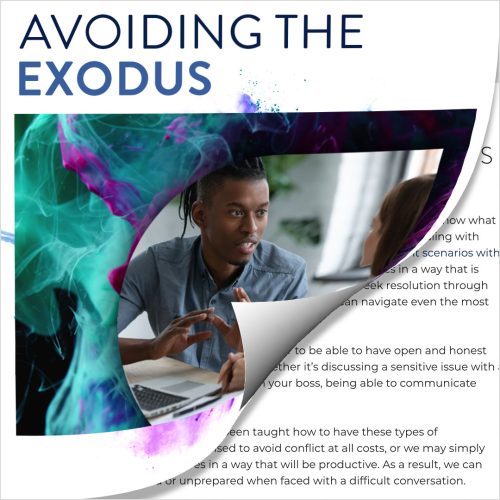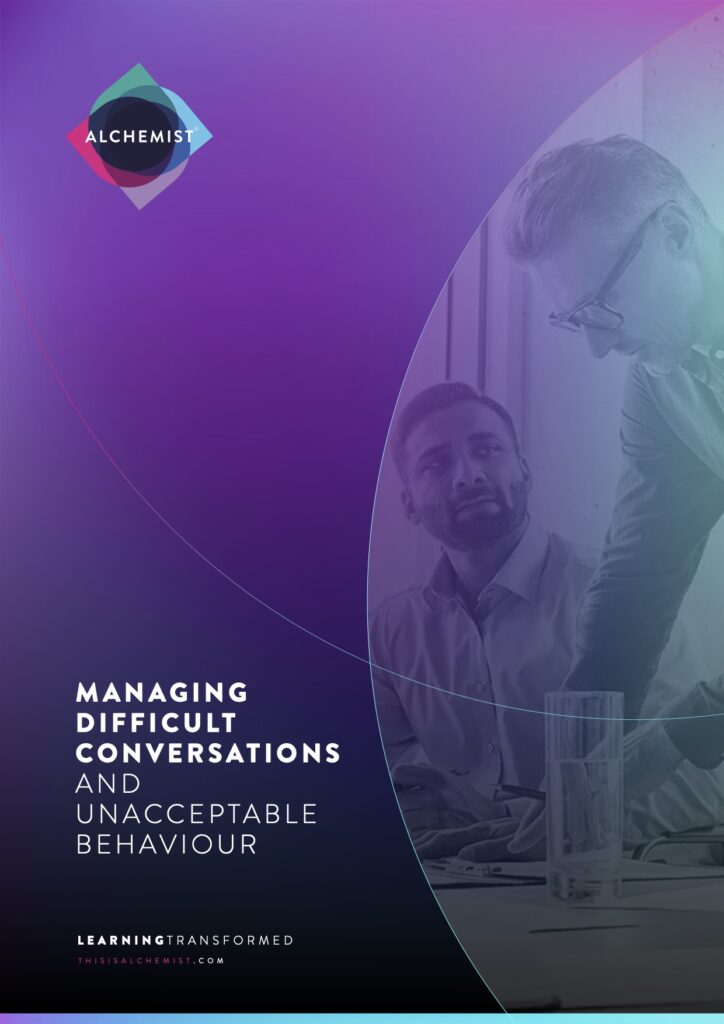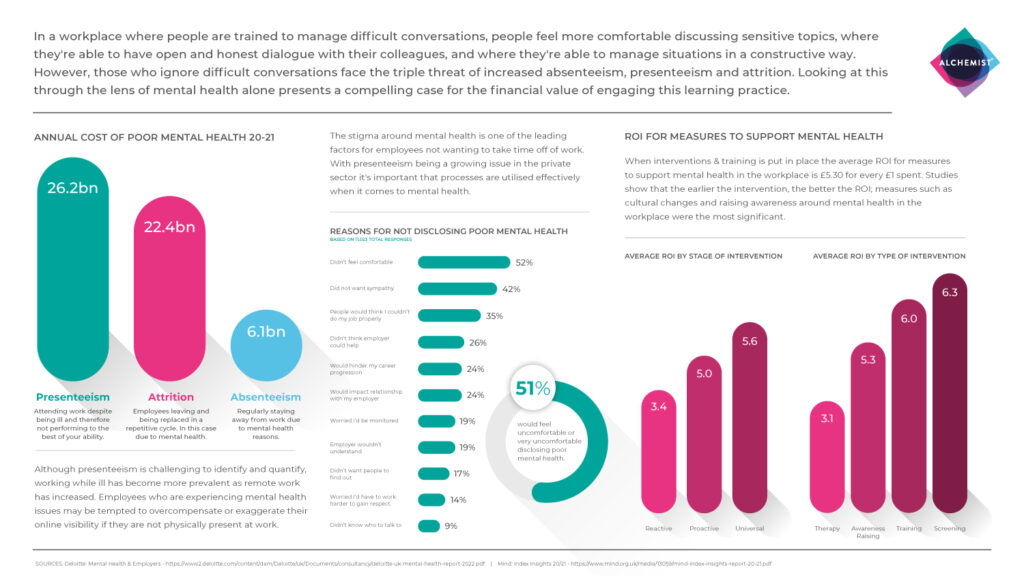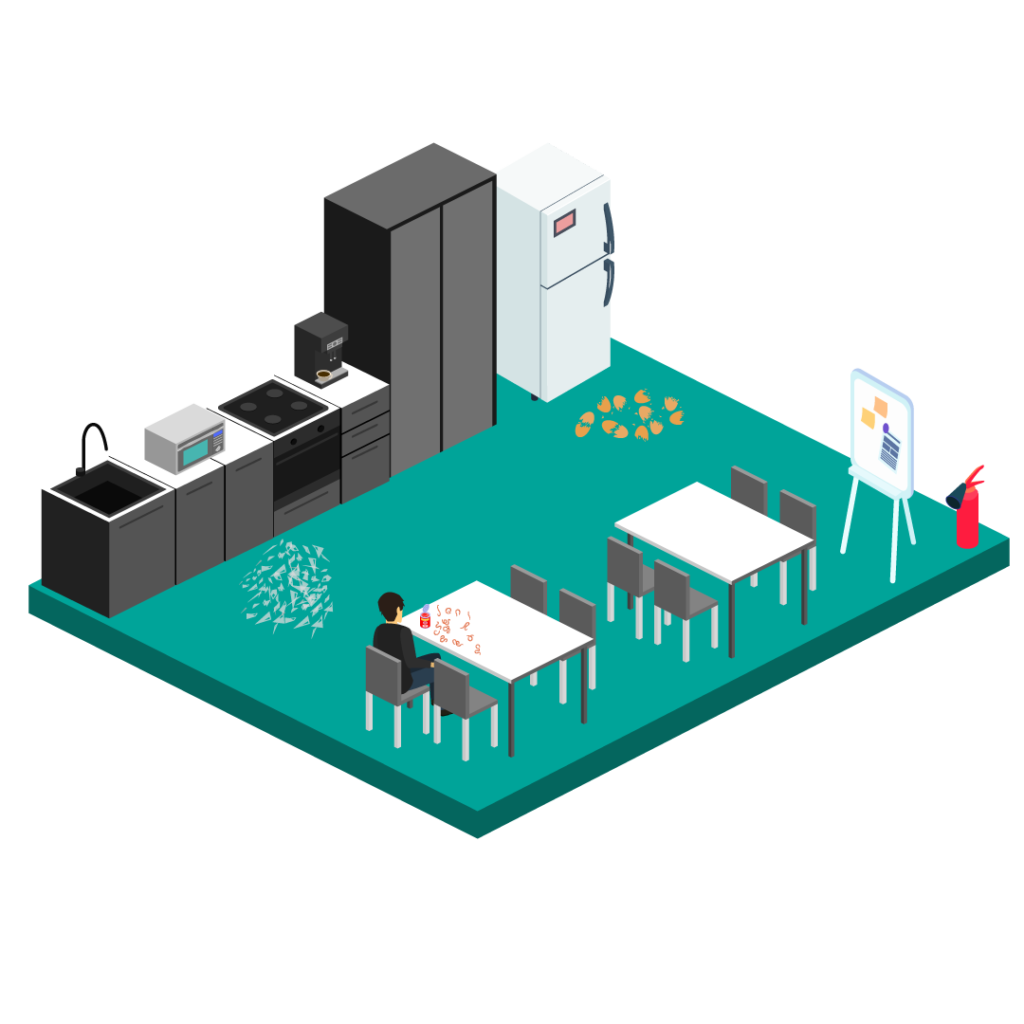Holding High Impact Conversations
Create better outcomes for difficult situations with Alchemist
Practical conversation training using live actors helps people learn how to communicate effectively and practise difficult conversations in a safe environment.
The training helps participants to understand the importance of body language and tone of voice, and it also provides them with an opportunity to practice their communication skills in a supportive environment, where mistakes can be made and rectified.
Hold high impact Conversations across some of the most important topics.
- Work Life Balance
- Pay and Benefits
- Client Account Management
- Development and Progression
- Performance
- Resetting Relationships

The programme Will Enable the participants to:
- Establish confidence in having open and honest conversations in the workplace
- Build trust with their colleagues
- Prepare, execute and follow up performance conversations
- Create the right virtual environment for open and honest conversations
- Consider the impact the conversation might have and be able to adapt and flex the tone
Why having that difficult conversation is one of the best ways to retain the best team.
using high impact conversation training to MANAGe DIFFICULT situations AND UNACCEPTABLE BEHAVIOUR
Take a look at our managing high impact conversations in practice
have you had one of these difficult work conversations recently?
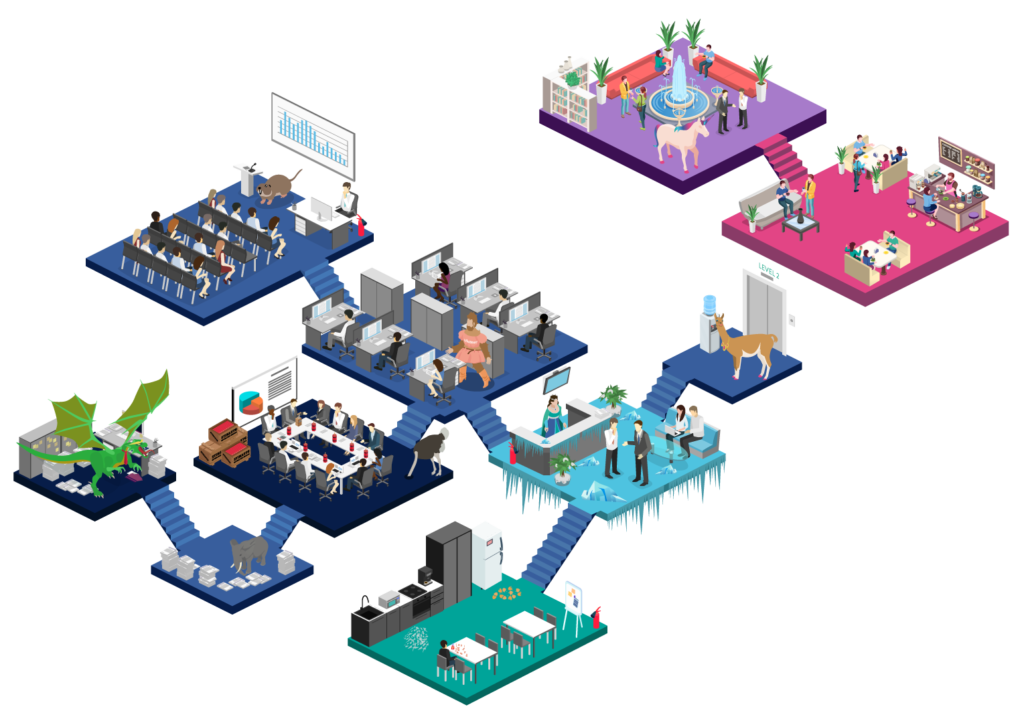
FROSTY RECEPTION
CLICHE KITCHEN
EXPLOSIVE CONVERSATIONS
OFFICE SASSQUATCH
THE IRRELEPHANT
OVER EAGER BEAVER
DRAMA LLAMA
SAFE SPACE
COMMON SENSORY ROOM
WITH ALCHEMIST
Get In touch To Find Out More
Other Top Programmes for looking after your talent
ATTRACT & RETAIN TALENT


ENHANCING PERFORMANCE PRODUCTIVITY FOR MANAGERS
A SOLUTION SET OF PRACTICAL TOOLS TO CREATE AND MAINTAIN A HIGH PERFORMANCE TEAM
Harmonising, maintaining, and improving both business and individual performance are the main goals of performance management. Alchemist offers a wealth of knowledge on how to create the ideal environments, cultures, and leadership styles to make performance management effective.
EMBEDDING & MAINTAINING CULTURE
It’s crucial to comprehend how to communicate what it means to work for your business and how it can align with a person’s personal strengths and values in a competitive market for talent to join and stay in your team.

frequently asked questions
Open and Honest is all about giving people the space to experience their own difficult or sticky conversations, whether that’s delivering feedback or tackling difficult messages head on and that’s really about supporting organisations with those differences in different ways. It’s all about creating that space allowing for individual practice and critically allowing them to receive feedback in that environment.
When a client comes to us to have a conversation around open and honest there’s normally some sort of Trigger or some sort of reason. Maybe they’ve had reports of a lack of value, maybe they’ve had lack of belonging coming through in their engagement surveys or maybe there’s some more significant pieces
around retention or attrition.
What we want to make sure we do is help to support the organisation and achieve those improvements. So, for an organisation who is looking to bring something like open and honest, they can expect to see better understanding and the ‘whole person’ being considered as part of their professional environment, which is critical to their motivation, their sense of being valued, their sense of being part of a community and belonging within that Community as well.
It does help in other pieces with the attrition and the retention rates that you might be experiencing, so for sure there are commercial and people benefits as part of a program such as this.
I think it breaks down into three key components one is heavily contextual the second is the nuanced feedback that we can give to individuals even within a group space and third the connection between intellectual and emotional and physiological.
So the first in terms of the rich context that’s something that we go to Great Lengths to get right. It needs to feel like we are creating the space in which they have experienced themselves, it needs to feel heavily identifiable to make the practice relevant and meaningful for them. The individualised feedback is something that we can tailor even within a larger group, so we give people the chance because they’re practising their own scenarios. We can work with them as individuals and help support them through their own strategies, whilst extrapolating the learning strategies, the learning tools, the learning frameworks they might be using, and to the peers so that even if you’re not practising you’re still learning through osmosis and through active engagement with that individual’s practice and then finally connecting the intellectual the emotional and the physiological.
Very often in learning mechanisms that we often use, we might be using frameworks or theories or desktop tasks. When we make it practical we really engage what it feels like to go through an experience that might put us into an emotional hijack situation. It might make our palms sweaty. It might make our eyes move all over the place and it allows us to really play through those emotions and allow us to support people in accepting those, incorporating those as part of their strategy and being aware of them so that when we’re building that into the communication strategy. We’re looking at the whole person, those are often the things that get overlooked in other mechanisms and those are the things that make the difference to help make sure that the learning is embeddable and sustained as they move back into the workplace.
In this kind of learning experience in other training methods we might think about it from a theoretical standpoint or in some cases even practice with peers. The challenge with this type of approach is that, if we don’t make it real, we don’t have the chance to experience what it feels like when you step into the room, or you join a call virtually and you can sense the tone. You don’t get all of the intangible elements of people’s behaviour and attitude and that experience, and we certainly don’t often get the chance to experience what it feels like to be in the room with something that we struggle with that is contextualised and individualised to the individual participants.
When we use real play professionals, we have the chance to gather those insights, bring to life those scenarios and critically the most important piece is for people to have the space to apply their strategies. Those strategies then have nuanced feedback, individualised feedback, both on how they made the other person feel critically and also how it felt for them.
We then allow them that chance to retry it, reapply themselves, rethink how they’re going to communicate to achieve their objective and that’s really important when we’re talking about open and honest conversations or difficult conversations because we want people to get it right while still having their individualised personality in there as well. So that’s why real play is so important as part of an open and honest type of learning program.
The first step for us is about research and insight, so whilst we have gathered Insight from the learning organisation or a team leader in terms of what they’re trying to achieve, what we want to know is what the lived experience is.
We want to speak to the people who are going to be working with, what we call ‘the end user’. We want to see the people who are impacted by these strategies, these approaches to behaviour communication so we can get a full image of what the real environment looks like and that’s what we use to position the content at the beginning of a session.
That then allows us to make sure that it’s identifiable and they can see themselves. They can see each other in that experience and that we start initially from a point of collective critique, collective insight and then that allows us to soften into more individualised practice as we move through the session. Really with a conversation around open and honest as a topic, we want to start to get as quickly as possible into specific scenarios that the group is challenged with so that we can tap into the themes around skill sets and the Frameworks that might be able to help support them.
For us it’s really important to make sure that we see ourselves in whatever it is that we’re bringing to life for them, the conversations that we’re bringing to life for them, and then support them very carefully into individualised practice from a starting point of working together.
So, the benefit to the learner is that it’s about them. The experience is incredibly individualised even if we’re working with a group and that allows us to get into their context, it allows them to see themselves as their manager or leader, it allows them to experience the people they lead or manage, and it allows them to experience those scenarios within the context of the functional organisation in which they operate. That is heavily beneficial for them to be able to make it an easier transition for the learning back into the workplace.
The other thing that is really beneficial for them is that it supports them in identifying what it is that is stopping them from having these open and honest discussions. We can get into the heart of the problem whether it is a lack of confidence, whether it is poor experience in their own past and it allows us to build up from the ground up the psychological safety and the skills that they need to be able to achieve that and in doing so we’re able to relay that learning to others who are part of that group and support them then with that easier transition back into the workplace so the fact that it is heavily individualised makes that transition and that applicability much more effective.
I think there’s always a bit of resistance around the idea of practice and I think that’s why we use real play and practice as our language and semantics are really important here because we don’t ask people to play a role they’re to play themselves.
We have real play professionals who are briefed and trained to help support in playing those situations and those scenarios out and that’s a careful process that they bring into the environment to help with psychological safety and to help with getting into those more individualised pieces. For us, it’s an initial resistance that might be present, but through the training, through the experience, very often we find that people add that we had that they haven’t had enough time, or they want more. It’s really important that we think about how something like difficult conversations or open and honest conversations programs are supported and sustained back into the workplace and what else they might need to help build on their individual capability.
I think the other thing that is always a challenge is evaluation and measures of success and we want to ensure that they’ve not only had a mindset shift to ‘it’s okay to start to have conversations that get into the full and whole self’ as well as then the actual skill shift that we’re looking for in terms of how they go about doing that. One is slightly more quantifiable than the other, so we support organisations in being able to kind of test the way that that mindset shift has happened over a period of time subsequent to the session itself, and we also want to be able to see the impact in terms of feedback, 360 feedback, feedback through self-engagement surveys, so that we’re seeing the shift towards a more open and a more supportive working environment through the Performance Management metrics that might be in place.
So, the benefit to the learner is that it’s about them. The experience is incredibly individualised even if we’re working with a group and that allows us to get into their context, it allows them to see themselves as their manager or leader, it allows them to experience the people they lead or manage, and it allows them to experience those scenarios within the context of the functional organisation in which they operate. That is heavily beneficial for them to be able to make it an easier transition for the learning back into the workplace.
The other thing that is really beneficial for them is that it supports them in identifying what it is that is stopping them from having these open and honest discussions. We can get into the heart of the problem whether it is a lack of confidence, whether it is poor experience in their own past and it allows us to build up from the ground up the psychological safety and the skills that they need to be able to achieve that and in doing so we’re able to relay that learning to others who are part of that group and support them then with that easier transition back into the workplace so the fact that it is heavily individualised makes that transition and that applicability much more effective.
